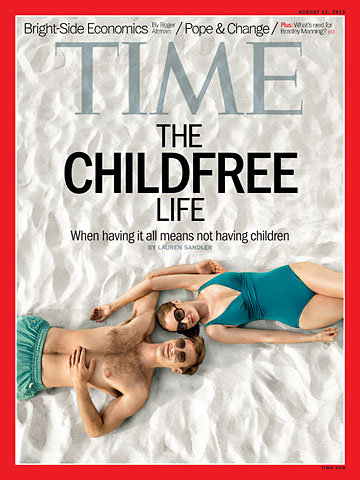
(3 of 4)
For those who don't hold the job, there are advantages. "I get to do all sorts of things: buy an unnecessary beautiful object, plan trips with our aging parents, sleep in, spend a day without speaking to a single person, send care packages to nieces and nephews, enroll in language classes, go out for drinks with a friend on the spur of the moment," says a happily partnered woman named Jenna Johnson, a Virginian who lives in New York. "I know all of this would be possible with kids, but it would certainly be more complicated. My plans — professionally, daily, long-term, even just for vacation — are free from all the contingencies that come with children."
Great Expectations
Few women spend their girlhoods aspiring to an unencumbered life. Daydreams often take the form of permanent attachments: monogamous passion yielding beatific motherhood. Yet as we get older, we change along with our economic, professional, social and romantic realities. Philip Morgan, director of the Carolina Population Center, has said in numerous interviews over the years that no one wants fewer than two children. He's referring to a raft of surveys that measure women's fertility intentions, in which young women are asked simply how many children they'd like to have. (It's not a question typically asked of young men.) Of course, they're not asked about professional opportunity costs or lasting romantic love.
But those factors contribute to postponed childbearing, which Morgan says is "the real story of fertility in the past 20 years. Women put off motherhood because of work, education or the lack of a desired partner, he says, and meanwhile "they develop lifestyles they enjoy." As Joyce Abma, a social scientist at the National Center for Health Statistics, says, "The decision to have children is not an on-off switch but more like a continuum." One woman told me about reading a magazine article when she was 40 on "the four stages of adulthood": college, career, house, kids. "I thought, My God, I'm stuck forever at No. 3," she said. She waited for panic to set in, but it never did.
The opportunity costs for an American woman who gets off the career track could average as high as $1 million in lost salary, lost promotions and so on, economist Bryan Caplan says. (Caplan, the author of the book Selfish Reasons to Have More Children, argues that she should go for it anyway.) Such concerns are nothing to dismiss, especially in a down economy, whether women articulate that sacrifice or not. But Kathleen Gerson, a professor of sociology at New York University whose research focuses on work, gender and family life, says postponement is far more complex than a résumé facing off against a biological clock: "It's what gives women time to build up their lives and think about how they want to live. Other commitments take the place of what motherhood might have meant." Gerson says women are living in a "damned if you do, damned if you don't" social context in a country that she believes emphasizes self-sufficiency equally alongside a deep commitment to motherhood. The mix breeds impossible conflict. Without independence, we're failures. With it, we're selfish.
The rise of attachment parenting, with its immersive demands, and the sheer economic cost of raising a child — for a child born in 2011, an average of $234,900 until age 18, according to the USDA, and $390,000 if your household earns over $100,000 — has made motherhood a formidable prospect for some women. Sociologist Julia McQuillen sees a clear relationship between the messages we hear about motherhood and an increasing desire to opt out of it. "At a cultural level there's the constant advice given to women that you need to invest more in your kids," she says. "If we make motherhood unrealistic, why would we want to do that job?"
Leah Clouse understands the amped-up demands of modern American parenting firsthand, as a nanny and a kids' art teacher. "It takes all of you, and I don't know that I want to give it all," the 27-year-old says. She and her husband Paul, who live in Knoxville, Tenn., married four years ago and are not planning to raise a family. Leah commits her time to working on her own creative projects and starting up a bakery; Paul, 29, devotes himself to writing a blog and holds a day job in customer service at a credit-card-processing company. They play a game each week in which they look at their schedule and try to imagine how they could fit a child into it, with their work and their involvement in their church. "It's insane already," Leah says. "I don't feel we can do what we do and be great parents — and for me, the emphasis would be on being great parents."
Motherhood's Ambient Roar
For 15 years at four different Universities, Demographer Stephanie Bohon has asked students if they intend to have children. "They all raise their hands," she says, "and then I ask why — and no one has an answer for me. That's what a social imperative does." The cultural noise about motherhood has become such a constant din that many of us don't even notice it. But ask any woman in her 30s or 40s who hasn't given birth and she'll likely tell you the ambient roar is oppressive. Products from cleaning solutions to cars are targeted at mothers. Magazines regularly offer features on the trials of parenting — TIME'S own ARE YOU MOM ENOUGH? cover contributed to the viral tide — and genuflect at gilded icons of celebrity motherhood, a sorority of which the Duchess of Cambridge is just the latest member. (I counted 36 images of Hollywood mothers and babies in a recent issue of Life & Style; tabloids have made a staple out of baby-bump watches.)
